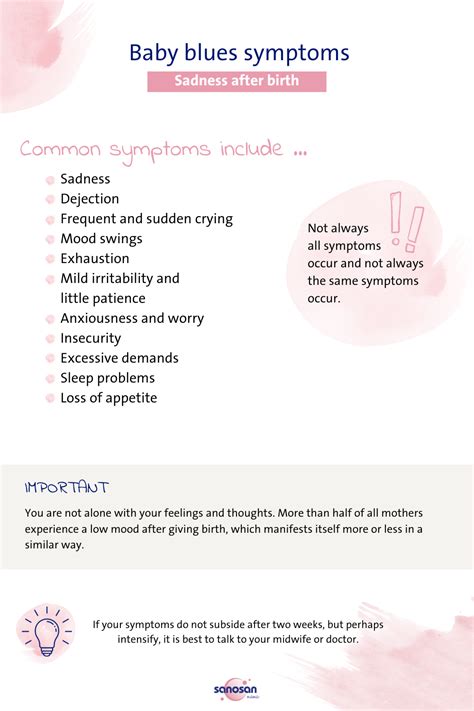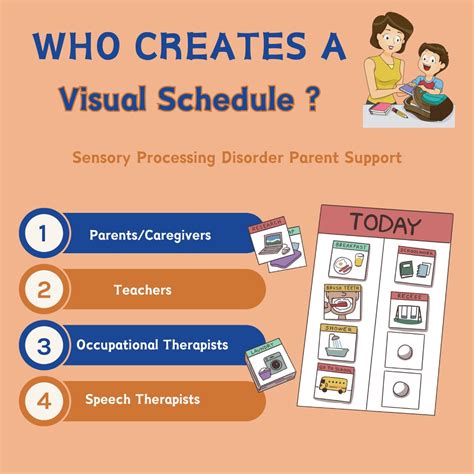Intro
Discover the causes and symptoms of baby blues, a common postpartum condition affecting new mothers, characterized by mood swings, anxiety, and depression, exploring its differences from postpartum depression.
The arrival of a newborn baby is a life-changing event that brings immense joy and happiness to new parents. However, for many new mothers, the postpartum period can be a challenging and emotional time. The "baby blues" is a common phenomenon that affects many women after giving birth, characterized by feelings of sadness, anxiety, and mood swings. In this article, we will delve into the world of baby blues, exploring its causes, symptoms, and effects on new mothers.
The baby blues are often referred to as a mild and temporary condition, but it can have a significant impact on a new mother's mental and emotional well-being. It is estimated that up to 80% of new mothers experience some symptoms of baby blues, making it a prevalent issue that deserves attention and understanding. The condition is often attributed to the hormonal changes that occur after childbirth, as well as the emotional and physical challenges of caring for a new baby.
As new mothers navigate the challenges of parenthood, they may experience a range of emotions, from excitement and joy to sadness and anxiety. The baby blues can manifest in different ways, and it is essential to recognize the symptoms to provide adequate support and care. Some common symptoms of baby blues include mood swings, tearfulness, irritability, and feelings of overwhelm. These symptoms can be intense and overwhelming, making it difficult for new mothers to cope with the demands of caring for a new baby.
Causes of Baby Blues

Other factors that may contribute to the development of baby blues include a history of depression or anxiety, lack of social support, and unrealistic expectations about motherhood. New mothers may also experience feelings of guilt, shame, or inadequacy, which can worsen the symptoms of baby blues. It is essential to recognize that baby blues are not a sign of weakness or failure, but rather a common and treatable condition that requires understanding and support.
Symptoms of Baby Blues

These symptoms can be intense and overwhelming, making it challenging for new mothers to cope with the demands of caring for a new baby. It is essential to recognize that baby blues are not a sign of weakness or failure, but rather a common and treatable condition that requires understanding and support.
Types of Baby Blues
There are different types of baby blues, including: * Mild baby blues: Characterized by mild symptoms that last for a short period, usually a few days or weeks. * Moderate baby blues: Involves more severe symptoms that last for several weeks or months. * Severe baby blues: Characterized by intense symptoms that can interfere with daily life and require medical attention.It is essential to recognize the type and severity of baby blues to provide adequate support and care. New mothers who experience severe symptoms or prolonged duration of baby blues may require medical attention and treatment.
Treatment and Support

It is essential to recognize that baby blues are not a sign of weakness or failure, but rather a common and treatable condition that requires understanding and support. New mothers who experience symptoms of baby blues should not hesitate to seek help and support from their healthcare providers, family, and friends.
Coping Strategies
New mothers can benefit from various coping strategies to manage symptoms of baby blues, including: * Prioritizing self-care: Making time for activities that promote relaxation and stress reduction. * Building a support network: Surrounding themselves with people who can provide emotional and practical help. * Seeking professional help: Consulting with healthcare providers or therapists to manage symptoms and develop coping strategies.By recognizing the causes, symptoms, and effects of baby blues, new mothers can take the first step towards seeking help and support. It is essential to remember that baby blues are a common and treatable condition that requires understanding and support.
Prevention and Risk Factors

New mothers who are at risk of developing baby blues should be aware of the risk factors, including:
- History of depression or anxiety
- Lack of social support
- Unrealistic expectations about motherhood
- History of trauma or stress
By recognizing the risk factors and taking steps to prevent baby blues, new mothers can reduce their risk and manage symptoms.
Conclusion and Next Steps

If you or someone you know is experiencing symptoms of baby blues, it is essential to seek help and support. New mothers can start by talking to their healthcare providers, family, and friends about their feelings and concerns. By working together, we can provide the support and care that new mothers need to manage symptoms of baby blues and thrive in their new role.
What are the symptoms of baby blues?
+The symptoms of baby blues include mood swings, tearfulness, irritability, and feelings of overwhelm. These symptoms can be intense and overwhelming, making it challenging for new mothers to cope with the demands of caring for a new baby.
How long do baby blues last?
+Baby blues can last from a few days to several weeks or months. The duration and severity of symptoms can vary depending on individual factors, such as hormonal changes, emotional and physical challenges, and social support.
Can baby blues be prevented?
+While it is not possible to completely prevent baby blues, new mothers can take steps to reduce their risk and manage symptoms. Building a support network, prioritizing self-care, and managing expectations can help reduce the risk of developing baby blues.
What is the difference between baby blues and postpartum depression?
+Baby blues and postpartum depression are two distinct conditions. Baby blues are a mild and temporary condition, while postpartum depression is a more severe and prolonged condition that requires medical attention and treatment.
How can I support a new mother who is experiencing baby blues?
+Supporting a new mother who is experiencing baby blues involves providing emotional and practical help. Listening to her concerns, offering help with household chores and childcare, and encouraging self-care activities can help alleviate symptoms and promote recovery.
